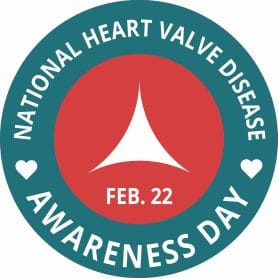First-Ever Heart Valve Disease Awareness Day Puts Condition in National Spotlight
Published February 22, 2017

For Immediate Release
Contact:
Email
202.688.1229
The Four ‘Listen to Your Heart’ Messages: Listen to Your Body, Know Your Risk Factors, Get Your Heart Checked Regularly, and Spread the Word and Raise Awareness
Washington, D.C., February 22, 2017 – The first-ever National Heart Valve Disease Awareness Day is being celebrated throughout the country today, as organizations, advocates, and individuals join together to increase recognition about the risks of heart valve disease (HVD) and improve detection and treatment access to ultimately save lives.
“Today we mark a nationwide movement to raise awareness about a disease that has not received the attention it demands. Considering that heart valve disease affects more than five million Americans, public awareness of the condition is shockingly low. A recent survey from the Alliance for Aging Research found that three out of four adults know little to nothing about valve disease,” says Susan Peschin, MHS, Alliance for Aging Research president and CEO. “The good news is that, while heart valve disease can be serious, innovative treatment saves lives and enables most patients to enjoy significant improvements in their quality of life. In this case, education and awareness have the potential to make a tremendous difference.”
National Heart Valve Disease Awareness Day activities begin with a 12 noon EST briefing on Capitol Hill in Washington, D.C. Expert speakers include: Gary H. Gibbons, M.D., director, National Heart, Lung, and Blood Institute, NIH, and Joseph E. Bavaria, M.D., former president, The Society of Thoracic Surgeons. It will be moderated by Peschin. The briefing will also be live-streamed here.
“The Society of Thoracic Surgeons is honored to partner with the Alliance for Aging Research on the first-ever National Heart Valve Disease Awareness Day,” says Bavaria. “This collaboration represents an annual opportunity to provide potentially life-saving information to millions of patients with heart valve disease. Educating patients about the signs and symptoms of valve disease—such as persistent shortness of breath or dizziness—will help open new conversations with primary care doctors and lead to earlier treatments.”
The briefing also features Dennis and Ann Dobkowski, American Heart Association Heart Valve Ambassadors. They will share their personal experience with the condition.
“We are so excited to come out and speak on Capitol Hill about our story,” says Dennis. “National Heart Valve Disease Awareness Day offers a forum to encourage people to be aware about the dangers of heart valve disease. People often have symptoms like I had and think it is connected to ‘old age.’ But they can be the warning signs for heart valve disease. We want people to listen to their heart and get it checked out with their doctor. It could be life-saving. In my case, it was, and every new day is a gift for me.”
The day’s activities conclude with a 4 p.m. EST Twitter chat on heart valve disease, which can be followed at #ValveDiseaseDay.
National Heart Valve Disease Awareness Day centers around four key messages:
- Listen to your body. HVD, which disrupts blood flow in the heart by affecting how a valve opens or closes, is not always serious, but can lead to major complications, including death. It can often be detected when a health care professional, while listening to the heart, hears a heart murmur. Follow-up testing may be needed to confirm the diagnosis.
- Know your risk factors. Age is the greatest risk factor for HVD. Unfortunately, the symptoms older adults with heart valve disease experience are too often dismissed as a “normal” part of aging. One in eight people ages 75 and older are estimated to have moderate to severe HVD. If someone has had a previous heart condition, they could be at higher risk for valve disease.
- Get your heart checked regularly. During regular check-ups, doctors often detect the early warning signs of HVD. Valve disease can usually be successfully treated with valve repair and replacement in patients of all ages.
- Spread the word and raise awareness. Through education efforts such as National Heart Valve Disease Awareness Day, strides can be made against the disease.
The campaign was initiated by the Alliance for Aging Research and has been joined by 20 national partners. It is also supported by a resolution (H.Res.146) introduced by U.S. Rep. Tony Cárdenas. The U.S. Department of Health and Human Services (HHS) has listed the awareness day on its National Health Observances Calendar (NHO) at Healthfinder.gov.
National Heart Valve Disease Awareness Day offers a website at www.ValveDiseaseDay.org, along with a Twitter page, @ValveDiseaseDay.
The Alliance’s activities around National Heart Valve Disease Awareness Day were conducted with unrestricted educational support from Edwards Lifesciences Foundation.
###
